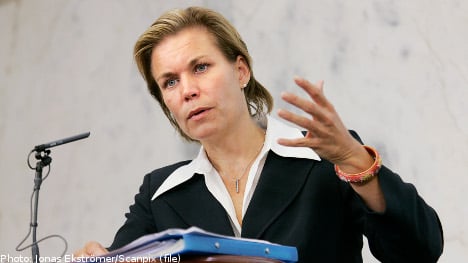Development aid minister Gunilla Carlsson on Thursday announced a reorganisation of Sida and appointed Charlotte Petri Gornitzka, former head of Save the Children Sweden, to lead the agency in the interim.
“I am very happy that we have been able to recruit Charlotte Petri Gornitzka as interim general-director,” Gunilla Carlsson said in a press conference on Thursday.
The leadership of Sida will be soon be further strengthened by the appointment of Bo Netz, who is currently a department secretary and former acting head of treasury’s budget division.
The decision to reorganise Sida’s leadership was announced by the government earlier on Thursday morning and the minister used the mid-morning press conference to comment on the reasons behind the decision.
“In order to ensure that Sida will overcome its high-profile business, economic and organizational shortcomings, the government has today decided on measures to ensure an efficient and effective authority.”
The minister penned a deeply critical article on the Newsmill website on Wednesday arguing that Swedish development aid suffers from comprehensive structural problems.
“Unfortunately I have misjudged the extent of the development aid agency’s challenges. The Alliance government’s restructuring of Swedish development aid must therefore be intensified and the control of Sida has to be reinforced. To achieve the ambition of a development aid which optimises its benefits, full-scale changes are required.”
According to Carlsson the straw which broke the camel’s back was when it emerged that Swedish funds had been involved in corruption and fraud within the Zambian health sector over the course of several years, without the agency drawing attention to the problem.
Swedish National Audit Office (Riksrevisionen) has criticised Sida in both 2008 and 2009 for inadequate control of development aid to, among other countries, Zambia and Tanzania. The office was furthermore critical of the government for its lack of management of the agency and Gunilla Carlsson promised then to address the issue.
Sida has been battling with its finances for several years and in 2009 was obliged to seek the help of the National Financial Management Authority (Ekonomistyrningsverket – ESV) to bring order to its income and expenditure.



 Please whitelist us to continue reading.
Please whitelist us to continue reading.
Member comments